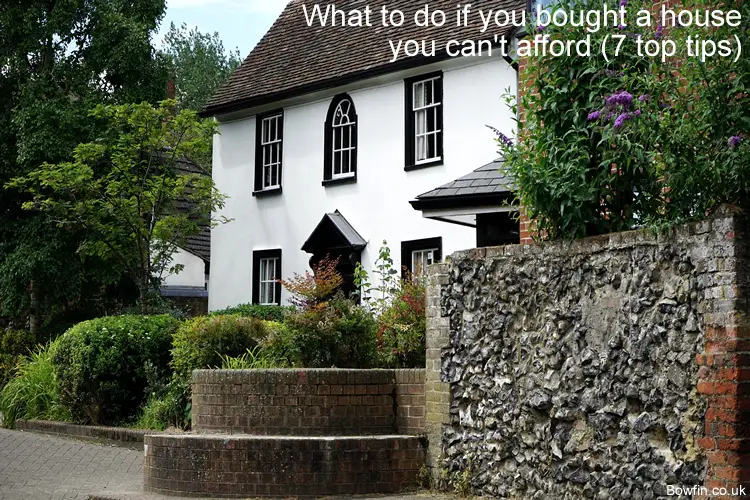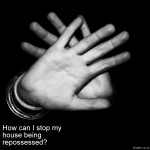
In this article I’m going to take a look at a few creative ideas of what to do if you bought a house you can’t afford. It might be that when you bought the house you stretched yourself too much. Or perhaps you’ve lost you job and can no longer afford the mortgage repayments.
So what to do if you bought a house you can’t afford?
- Sell and down-size or rent.
- Change your mortgage terms with your existing lender or remortgage to a better rate.
- Let a room in your house.
- Let the whole house and move to a smaller house.
- Get a second job or side income.
- Borrow from friends or family to reduce the mortgage.
- Try to pay down your mortgage.
Let me explain each of these options in more detail.
What are your options if you’ve bought a house you can’t afford?
1. Sell up and go smaller or down-size or even rent a house
Whilst this may not be what you would like to do, especially if your house is your dream home, but you may need to be realistic. If you can’t afford the house you live in perhaps it is best to sell it and down-size.
Selling the house you can’t afford to buy a smaller house, is possibly one of the least stressful ways to overcome this situation. However, you may struggle with this solution, if the house you live in is suitable for the size of family you have.
Down sizing may not be an option when you have a family that ‘fills your house‘.
Move to a cheaper area or rent a house you can afford
You may have to move to a cheaper area that gives you the number of bedrooms you need, but with a more affordable price tag. The other option would be to sell the house you can’t afford and rent for a while.
One of the big disadvantages to this down-sizing solution is the buying and selling costs. These costs could quite easily eat into your deposit on the new home. You’ll have estate agents fees, legal fees, surveyors fees, Stamp Duty and removal costs.
This is when renting may be a better option, as although you’ll still have the selling costs to contend with, you won’t have any of the buying costs. One of the most expensive costs associated with buying a new house in the UK is Stamp Duty.
2. Change your mortgage terms with your existing lender or remortgage on a better rate
One way to help you afford your house is to change your mortgage payments. There are a few ways to do this. The best way is to speak with a mortgage broker. Whilst a broker will charge you a fee, they will usually pay for themselves in the service you receive.
A mortgage broker will be able to look at the whole mortgage market and help you to find the best rate that suits your needs.
One option would be to see if you can switch to an interest only mortgage. Interest only mortgages used to be a lot easier to get, but these days they are almost non-existent for home owners. But if you are able to switch to an interest only mortgage, bear in mind that at some point in the future you will need to pay back the capital you borrowed.
The other option is to find a mortgage with a better interest rate, or to switch to a mortgage with a longer term. By reducing the interest rate or extending the term will serve to reduce your monthly mortgage payments.
This reduction may be enough to help you afford your house.
It may be possible to switch to better terms to reduce your mortgage payments with your current mortgage lender. So you may want to approach them in the first place before contacting a mortgage broker.
Ask for a mortgage repayment holiday
If your affordability problem is short term, you may seek a mortgage repayment holiday from your current mortgage lender.
A repayment holiday is a period where you don’t pay your monthly mortgage payments. But this is done in agreement with your lender. Don’t stop paying your mortgage without your lender’s agreement, otherwise you’ll be in mortgage default.
Mortgage default will seriously affect your credit score and you may end up having your home repossessed.
3. Let a room or rooms to paying guests or tenants
Another option to help if you bought a house you can’t afford is to let one or two rooms out in your house. The additional income may be enough to help you afford you home.
In the UK there is the ‘Rent a Room Scheme‘. This scheme allows you to rent a room tax free, up to a certain threshold. The current tax free amount is set at £7,500 per annum, which is equivalent to £625 per month.
The are many ways to rent a room in your house, which includes using spare room, AirBnB, Booking.com and speaking to a local letting agent.
4. Let the whole house out and find somewhere smaller to live
You could become a landlord and let your complete house out to tenants. But before you do this you need to be aware of the tax implications of becoming a landlord.
The UK government have been extremely hard on landlords in recent years. In fact with the introduction of the Section 24 Tax or ‘Tenant Tax‘ the UK government have pretty much knocked this solution on the head. But Property 118 may have a solution for you on this. Here’s a testimonial from a happy customer.
“After a gruelling 3 year divorce I was left with 15 properties, 17 year old twins to support through University and the prospect of Section 24 on the horizon.
Testimonial on Prioperty118.com; read JB’s full review here from a property landlord taking advance of Section 24 tax advice.
I had read about Mark Alexander’s spectacular success in fighting West Brom and winning £27 million in repayments to landlords who had been overcharged. It was a truly magnificent result and benefited every landlord in the country who has a tracker mortgage.
I knew I needed help to restructure so decided to invest in a consultation with Mark. This was an excellent decision. Mark grasped my situation quickly, knew what questions to ask and is knowledgeable on the landlords ultimate trinity of property, finance and law.
My twins are now 18 and I have formed a partnership with them. I can choose how much profit to allocate to them to utilise their zero/basic rate tax band and keep myself in the basic rate tax band. In 3 years time I will be able to incorporate the partnership WITHOUT needing to refinance, WITHOUT paying SDLT and WITHOUT paying CGT. Magic!“
The problem with this most ridiculous tax is that you can no longer off-set your mortgage interest against the rental income. This means you would have to pay tax on your rental income, less any expenses on the property, and then you’d have to pay the interest out of what is left.
Depending on how much you’ve borrowed, you could end up paying more in interest than the net rent you receive.
There are other considerations to think about before becoming a landlord, but with the Section 24 Tax problem, you may choose to not bother with this option.
5. If you can’t afford your mortgage get a second job or a side income
You could seek to make more money by either getting a second job or by starting a side business. Sometimes referred to as a ‘side gig‘.
Be careful with your existing employer, as you may find your employment contract has a clause to specifically exclude this option.
If there is this clause in your employment contract, you may be able to approach your employer and explain the situation. You may be able to get their approval to have a second job or to start a new small business on the side.
But what you don’t want to happen is to lose your main job for the sake of a second income. As this will put you into even more difficulty.
You never know this may lead to a pay rise from your employer, as they may want to help.
6. Borrow from friends or family to reduce the mortgage to a more affordable payment amount
Not everyone likes to ask for money and some may not even have this option in the first place. But it may be a solution to help you keep the house you can’t afford.
Always remember that you will still need to pay your friend or family member back. But I suggest you draw up a loan agreement, as this may prevent arguments or disagreements in the future.
7. Consider using other savings or investments, including your pension to pay down your mortgage
One way to reduce your monthly mortgage payments is to reduce the amount you owe in the first place. Having said that, by simply paying down your mortgage with a lump payment won’t automatically reduce the monthly payments.
Mortgage lenders usually keep the mortgage payments the same, even where lump sums are paid off the mortgage. But instead what happens is the term of you mortgage will be shortened, as you have less to pay back.
This isn’t what you want, as your aim is to reduce the monthly mortgage payments. So instead, either speak to your mortgage lender and ask for reduced monthly payments after you’ve paid down what you owe.
Alternatively, switch mortgage lenders, where you’ll be borrowing less and therefore your monthly mortgage payments will automatically come down as a result.
What you shouldn’t do if you can’t afford your mortgage
Having explained the seven options of what you should do if you bought a house you can’t afford, it’s worth mentioning what you shouldn’t do too.
The first is to not miss your mortgage payments. Once you fall into arrears on your mortgage, you are then at risk of being repossessed. You want to avoid being repossession at all costs.
Once you’ve been repossessed, it’s much more difficult to get a mortgage afterwards, as a repossession will remain on your credit report for around seven years afterwards.
You may also be thinking about how to legally get out of your mortgage. But even with this you may be left with lasting problems on your credit report in a similar way to a repossession does.
If you are finding things difficult at present. Perhaps you are struggling to sell your house for what you owe, which is making it more difficult to gain control of your spending in a home you can’t afford, please feel free to contact us to see how we might help.
I hope you’ve enjoyed this article on what to do if you bought a house you can’t afford
If you’ve enjoyed this article on what to do if you bought a house you can’t afford one please share it on your favourite social media site.
Also, if you have any questions, please feel free to comment below too. Alternatively, if you need more help, please feel free to contact us on our contact us page here. Or join the discussion and ask your question in the property forum.




